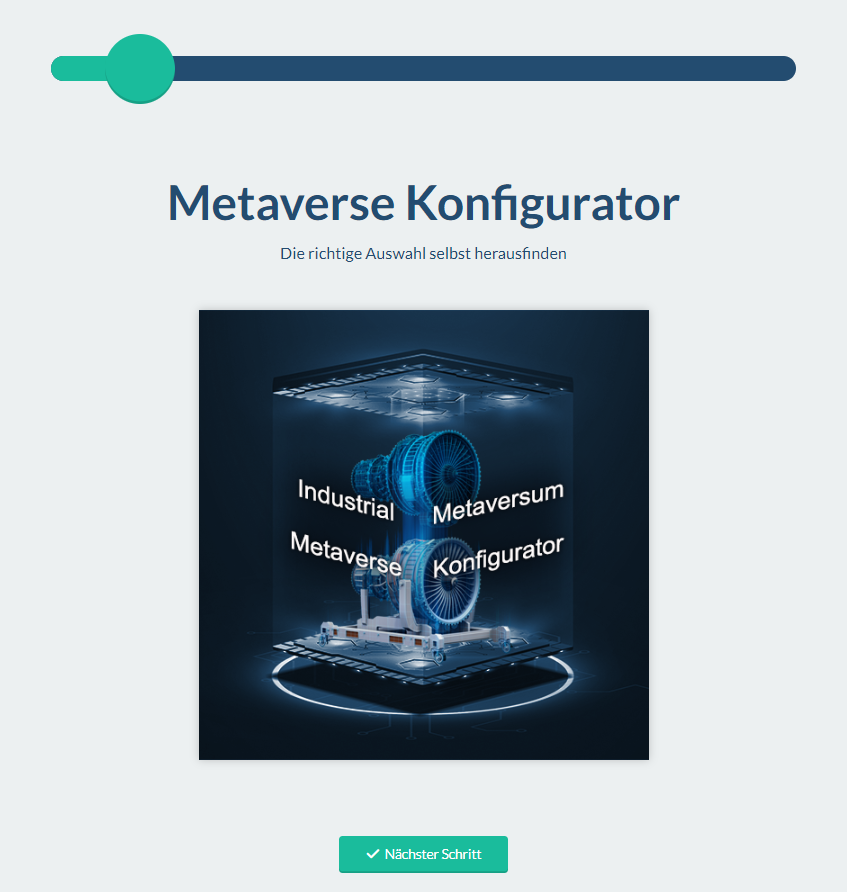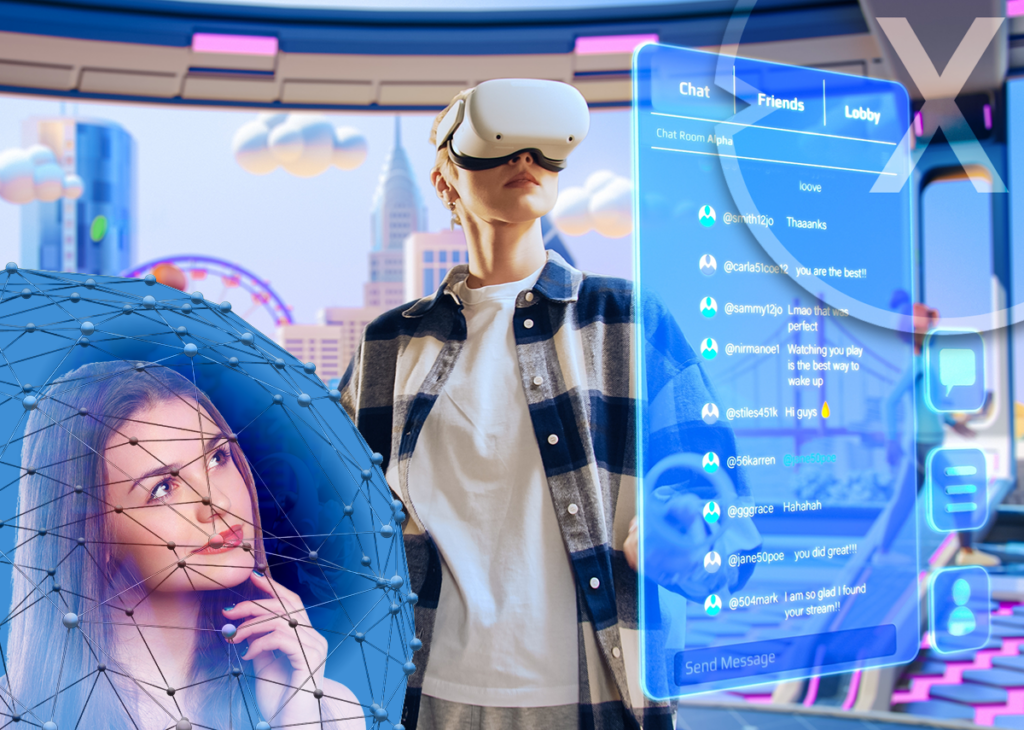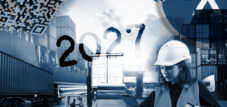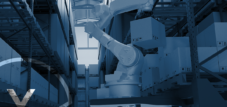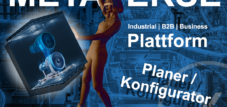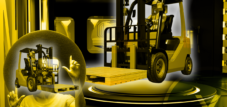Industrial Metaverse Logistics: strong interest, but… – challenges for global logistics, intralogistics & freight forwarding
Language selection 📢
Published on: October 17, 2023 / update from: October 17, 2023 - Author: Konrad Wolfenstein
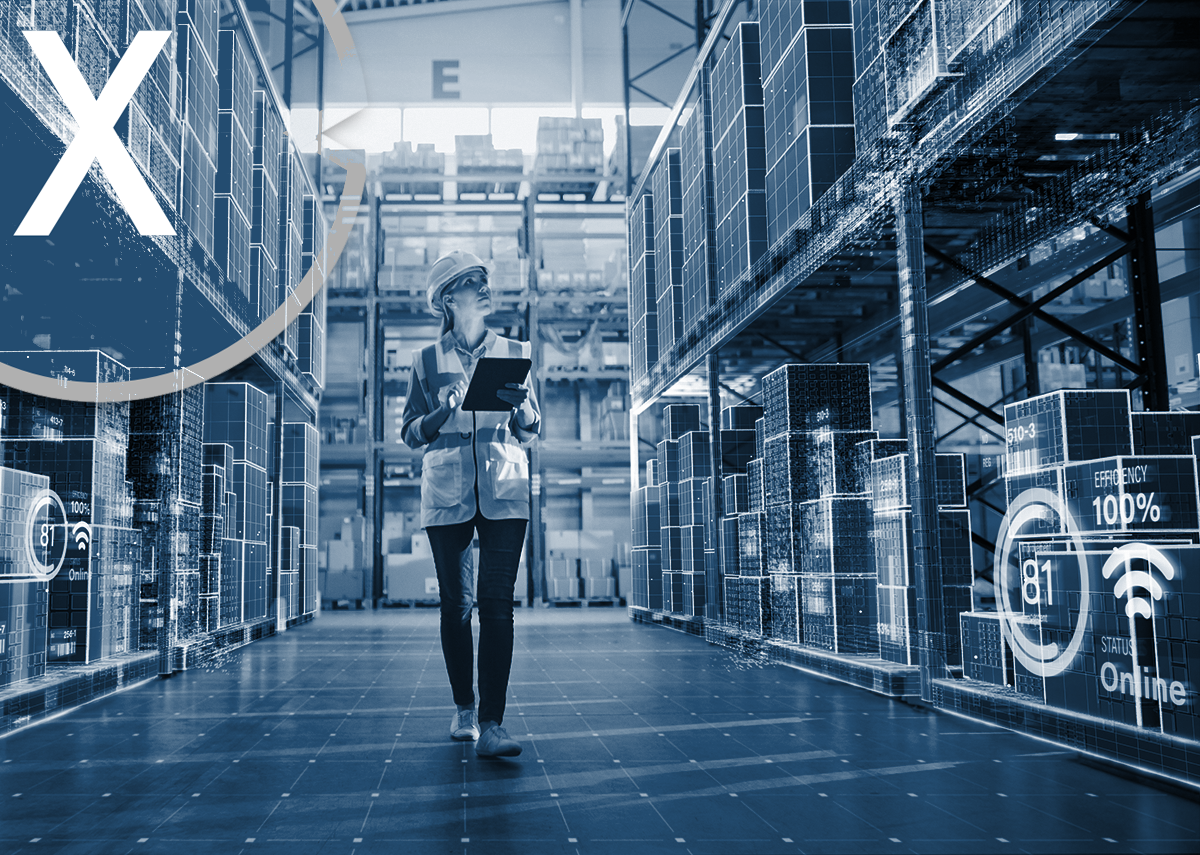
Industrial Metaverse: strong interest in logistics, for global logistics, intralogistics & freight forwarding – Image: Xpert.Digital
🌐 Industrial Metaverse: strong interest in logistics
The Industrial Metaverse, an innovative virtual work environment, is becoming increasingly important, particularly in the logistics, transportation and utilities industries. A joint study by Nokia and EY, published in June 2023, involving 860 executives from six countries, including Germany, the United Kingdom, the United States, Brazil, Japan and South Korea, highlights the promising prospects of this emerging field.
🏭 The Metaverse in the Workplace: In-Depth Examination of the Transportation, Utilities, and Logistics Industry
The Industrial Metaverse opens up new horizons for the world of work. It is no longer just a concept from science fiction, but is already being actively researched and implemented in various industries. Logistics, transport and supply chain management in particular show a particularly strong interest and openness to the industrial metaverse.
📊 Three application scenarios in focus
The study identifies three main application scenarios that are of great importance in the industrial metaverse for the area of logistics and supply chain management:
1. 🌟 XR-enhanced UX research
Extended Reality (XR) offers the possibility of merging real and virtual worlds. In the logistics industry, this enables realistic user experience (UX) research. Companies can use XR technologies to prototype warehouses, loading yards and transportation routes and analyze usability and efficiency even before physical investments are made. This saves time and resources and enables optimal design of logistical processes.
2. 🤖 Autonomous delivery robots
The Industrial Metaverse provides the ideal environment for the development and training of autonomous delivery robots. In a virtual world, companies can simulate scenarios in which autonomous robots transport packages from one location to another. This makes it possible to prepare the robots for a wide range of situations and optimize their performance before they are used in the real world. The logistics industry hopes this will increase efficiency and speed in parcel delivery.
3. 📦 Supply chain optimization
Integrating the Industrial Metaverse into supply chain optimization is a key aspect for the logistics industry. By creating digital twins of warehouses, distribution centers and transportation routes, companies can monitor and optimize their supply chains in real time. Bottlenecks can be identified and resolved early, making deliveries more timely and cost-effective. This leads to overall improved logistics performance.
🚀 The expectations of the Industrial Metaverse
The results of the study show that logistics, transport and supply chain management are particularly open to the industrial metaverse. Executives expect these applications to accelerate the onboarding of external partners and fundamentally change the way fleets are optimized, bottlenecks are identified, and warehousing and distribution processes are configured.
A key expectation is to fully integrate data across different locations. This enables seamless collaboration and communication between different actors within the supply chain. Virtual environments in the Industrial Metaverse provide the platform for this integrated collaboration, where assets can be controlled in a shared virtual environment.
🌟 Changes and establishment
The Industrial Metaverse promises to fundamentally change the world of work in logistics, transport and supply chain management. The results of the Nokia and EY study show that this area is particularly open to the new possibilities of the Metaverse. The identified application scenarios, including XR-enhanced UX research, autonomous delivery robots and supply chain optimization, offer promising ways to increase efficiency and performance in the logistics industry.
The integration of the Industrial Metaverse into work processes enables better collaboration, real-time monitoring of supply chains and the optimization of logistical processes. Companies that use this technology early could gain a decisive competitive advantage and have a significant impact on the future of logistics. It remains exciting to see how the Industrial Metaverse will develop in the coming years and establish itself in the world of work.
📣 Similar topics
- 🌐 The Industrial Metaverse: Future of Logistics
- 🤖 Autonomous delivery robots in the metaverse
- 📈 Logistics in transition: Industrial Metaverse
- 🏭 Metaverse Revolution: Focus on logistics
- 📊 Potential of the Industrial Metaverse in Logistics
- 🌟 Industrial Metaverse: Opportunities for logistics companies
- 🔄 The transformation of the logistics industry in the metaverse
- 📦 Virtual warehouses: Metaverse in logistics
- 🚚 Logistics 2.0: The Industrial Metaverse
- 💼 The changing world of work: Metaverse in logistics
#️⃣ Hashtags: #IndustrialMetaverse #Logistics #MetaverseRevolution #Supply Chain Optimization #AutonomousRobots
🗒️ Xpert.Digital: A pioneer in the field of extended and augmented reality
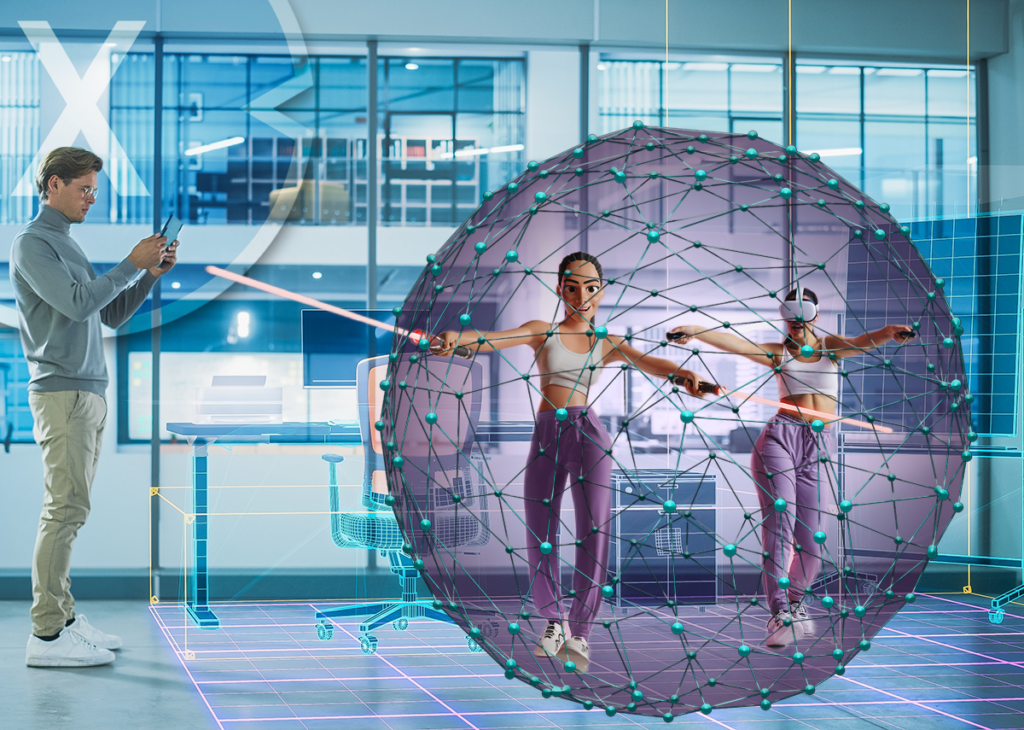
Find the right Metaverse agency and planning office such as a consulting firm - Image: Xpert.Digital
🗒️ Find the right Metaverse agency and planning office such as a consulting firm - search and search for top ten tips for consulting & planning
In the age of digitalization, where technologies such as Extended Reality (XR) and the Metaverse are constantly becoming more relevant, Xpert.Digital positions itself as an opinion leader and pioneer. With over 1,500 specialist articles, Xpert.Digital has established itself as a central point of contact for the industry.
🌌 Extended Reality (XR): The best of both worlds
Extended Reality is a collective term that includes virtual reality (VR), mixed reality (MR) and augmented reality (AR). Xpert.Digital is committed to creating immersive XR experiences that are both informative and entertaining.
- Interactive Experiences: XR allows users to immerse themselves in virtual worlds and interact with their surroundings in ways previously unimaginable.
- Education and Training: XR can be used for educational purposes to convey complex topics and concepts in an understandable and tangible way.
- Entertainment: Whether games, films or art – XR opens new horizons in digital entertainment.
🔮 Augmented Reality (AR): See the world through digital eyes
Augmented Reality, a particular focus of Xpert.Digital, makes it possible to integrate digital information or graphics into the real world. The possibilities are nearly unlimited.
- Marketing and Advertising: AR can be used to create interactive advertising campaigns that engage customers in a whole new way.
- Everyday help: From navigation apps that project the route directly onto the street to furniture apps that show what a new sofa would look like in the living room - AR makes it possible.
🌐 The Metaverse: The Next Big Thing
The Metaverse is a virtual world where people can interact through avatars and create shared experiences. Xpert.Digital recognizes the enormous potential of the Metaverse and is working to translate this potential into usable products and services.
- Social Interaction: The Metaverse offers the opportunity to connect with people from all over the world and share common experiences.
- Economy and trade: Virtual goods and services can be traded in the metaverse, which opens up completely new business models and sources of income.
- Creative Freedom: From building your own worlds to designing custom avatars, the Metaverse is a place of endless creative possibilities.
🚀 Xpert.Digital at the forefront of innovation
Xpert.Digital shows how a company can be at the forefront of the technological revolution. With their focus on XR, AR and the Metaverse, they are well positioned to shape and define the future of digital interaction.
More about it here:
🌐 Metaverse and Transport: An exciting development
We are currently witnessing an exciting development in transportation, supply chain management and logistics that is outperforming other industries in adopting the industrial and corporate metaverses. According to the current study, 61 percent of the companies surveyed have already gained practical experience with these metaverses, be it through pilot projects or the implementation of use cases. Interestingly, 98 percent of those who have not yet had experience plan to use the technology within the next two years. In this section, we will take a closer look at the trends and developments in the Metaverse space and its impact on transportation, supply chain management and logistics.
🌍 Metaverse usage worldwide
According to the study, the USA and the UK are already well ahead in terms of using the Metaverse. Over 70 percent of respondents in both regions have already tested or implemented a use case. In comparison, Japan, South Korea and Germany are still lagging behind in terms of using the metaverse in transportation, supply chain management and logistics. But there are encouraging signs here too, with 100 percent of respondents in these countries reporting plans to use the Metaverse in the next two years.
🚀 The Metaverse and its meaning
But what exactly is the Metaverse, and how can it revolutionize the transportation and logistics sector? The Metaverse is a virtual universe that combines digital and physical realities. It is a space where users can interact with each other through immersive technologies such as virtual reality (VR) and augmented reality (AR). The Metaverse provides unlimited opportunities for collaboration, training, planning and executing tasks in a virtual environment.
📚 Training in the Metaverse
One area where the Metaverse is already having a positive impact is the training and development of employees in the transport and logistics sector. Companies use virtual training environments to train employees in safe and realistic scenarios. This can be particularly advantageous in areas such as the transport of dangerous goods or the operation of complex machines. Employees can familiarize themselves with the challenges that await them in the real world in a safe virtual environment without taking actual risks.
🌐 Process optimization in the metaverse
Another interesting aspect of the metaverse in transportation is the ability to visualize and optimize complex logistics processes. Companies can create 3D models of their supply chains to identify bottlenecks and inefficient areas. This allows them to plan more effective routes, optimize inventory levels and reduce delivery time. The visual representation of logistics processes in the Metaverse offers a new approach to process optimization.
🤝 Collaboration in the Metaverse
The integration of Metaverse technologies into the transportation and logistics sector also impacts communication and collaboration within companies and between different actors in the supply chain. Virtual meeting rooms and conferences in the Metaverse allow employees to collaborate regardless of their physical location. This can increase efficiency and reduce the need for physical meetings and travel, resulting in cost savings.
🚗 Metaverse in transportation
Another interesting use case of the Metaverse in transportation is the use of augmented reality (AR) in the maintenance of vehicles and systems. Technicians can use AR glasses or devices to access important information and instructions while performing repairs or maintenance. This can shorten the duration of maintenance tasks and minimize errors because technicians have direct visual access to the necessary information.
🚚 Metaverse in the supply chain
When it comes to the supply chain, the metaverse also offers the opportunity to make the entire process more transparent and traceable. By integrating blockchain technology, companies can view real-time information about the status and location of goods in the supply chain. This creates trust and enables companies to react more quickly to irregularities and minimize delivery bottlenecks.
🔒 Security Considerations in the Metaverse
However, implementing Metaverse technologies requires not only technical expertise but also security considerations. Since many of these applications rely on sensitive data and information, it is critical to implement robust security measures to prevent data leaks and cyberattacks.
👩🏫 Training of employees
One of the challenges companies face when adopting the Metaverse is employee training. Because these technologies are often new and complex, it is important to provide training programs to ensure employees can use them effectively.
❓ Open questions and challenges
It is also worth noting that the development of the Metaverse is still in its infancy, and there are many open questions and challenges that need to be resolved. These include legal and ethical issues such as protecting user privacy and regulating virtual currencies in the metaverse.
🌐 Future of the metaverse in the transport and logistics sector
The Metaverse will undoubtedly revolutionize the transportation, supply chain management and logistics sectors. It provides opportunities for training and education, process optimization, better communication and collaboration, improved vehicle and asset maintenance, and more transparent supply chain tracking. Companies that invest in these technologies early could gain a competitive advantage and be better prepared for the future.
The future of the metaverse in the transportation and logistics sector looks bright, and it will be exciting to see how this technology evolves and how companies use it to improve their operations and make them more efficient. It remains to be seen what innovative applications and solutions will emerge in the coming years, but one thing is certain: the metaverse has the potential to fundamentally change the way we understand transportation and logistics.
📣 Similar topics
- 🌐 Metaverse on the rise: How it affects transportation and logistics
- 🚚 Metaverse: The Future of the Supply Chain
- 📈 Metaverse Technologies in the Transportation Sector: Current Trends
- 🌟 Metaverse in logistics: opportunities and challenges
- 👥 Metaverse and teamwork: The new dimension in logistics
- 🛠️ Metaverse in maintenance: increasing efficiency in transport
- 🔗 Metaverse and Blockchain: Transparency in the supply chain
- 🔒 Security in the Metaverse: Protecting sensitive data
- 📚 Training for the Metaverse: Getting employees fit
- 🌄 The Future of the Metaverse in Transportation
#️⃣ Hashtags: #Metaverse #Transportation #Logistics #SupplyChain #Technology
📋 Challenges and difficulties in the industrial and corporate metaverses
🌐 The introduction of Metaverse technologies in various industries undoubtedly has a lot of potential to transform the way companies work and provide innovative solutions. But at the same time, companies, especially in the areas of transportation, supply and logistics, face a variety of challenges and difficulties when using the metaverse.
🤝 One of the first and most important points that companies in these industries need to consider is identifying internal experts who can clearly demonstrate the value of the metaverse. This is a common challenge that occurs across many industries. Employees need to be trained and sensitized to fully understand and utilize the potential of this technology. This requires time and resources for training and continuing education.
📊 Transportation, utilities, and logistics companies that have experience using the metaverse report slightly lower difficulty levels in project duration, budget, and adoption readiness compared to other industries. This could be due to the fact that they have already gone through a certain learning curve and are better prepared to face the challenges.
📈 An interesting aspect is that 24 percent of surveyed companies with experience in the metaverse noted a reluctance to adopt the technology, compared to an average of 30 percent in other industries surveyed. This could indicate that companies in transportation, utilities, and logistics have recognized the benefits of Metaverse use cases early on and are therefore less hesitant.
🧠 However, the biggest concerns in these industries revolve around the lack of expertise and technical difficulties. These are the two most commonly cited challenges experienced businesses face. The lack of expertise could be due to the fact that Metaverse technology is relatively new and there are not enough experts who fully understand it. The technical difficulties could relate to the complexity of the data, which is often siled across different locations and suppliers.
📡 Managing and centralizing this data is critical to delivering Metaverse use cases. Some companies need to significantly improve their data infrastructure to meet the demands of the metaverse. This could mean modernizing legacy systems or integrating data from different sources. A transportation director at a global automaker reported that his organization has already committed significant time and resources to digitalization, including a large internal technology migration from legacy to cloud solutions. This has limited the budget and resources for the metaverse, especially when it comes to scaling.
🌐 Another issue that is particularly relevant in some countries concerns infrastructure. A reliable network is crucial to running Metaverse and Industry 4.0 solutions. However, some countries lack the technical capacity and bandwidth to efficiently support the metaverse. This can significantly hinder the adoption and use of this technology and may require investment in infrastructure.
🚀 It is important to emphasize that despite these challenges, the potential of the metaverse for companies in transportation, utilities and logistics is significant. The technology offers opportunities to optimize logistics processes, train employees in virtual environments and improve customer communication. However, companies must be prepared to address these challenges and take the necessary steps to realize the full potential of the metaverse.
🌐 Adopting the metaverse in industrial and enterprise applications is an exciting but complex process. Companies must focus on training their employees, improving their data infrastructure and overcoming technical challenges to successfully enter this new era of digital transformation. Despite the difficulties that may arise, the metaverse offers promising opportunities for companies willing to address the challenges and reap the benefits.
📣 Similar topics with Emojis:
- 🌐 Metaverse in Industry: Challenges and Opportunities
- 💼 Metaverse Technologies in Business: Overcoming Difficulties
- 🚚 Transport and Logistics in the Metaverse: A New Era
- 📚 Training in the Metaverse: Knowledge as the key to success
- 🌐 Metaverse infrastructure: Expansion for enterprise-related applications
- 💡 Metaverse Potential: Challenges and Solutions
- 🌐 Metaverse technology in the utilities industry
- 🔧 Technical hurdles in the metaverse: strategies to overcome them
- 🌐 Metaverse use cases in industry: experiences and insights
- 📈 Metaverse transformation: success factors for companies
#️⃣ Hashtags: #Metaverse #Industrie40 #Challenges #Companies #Digitalization
Our Industrial Metaverse configurator
Just try out our universally applicable (B2B/Business/Industrial) Metaverse configurator for all CAD / 3D demo options:
Xpert (B2B/Business/Industrial) Metaverse configurator for all CAD / 3D data can be used on all devices, one platform!
Suitable for:
🌐 The metaverse in the corporate world
Metaverse has become significantly more important in recent years and is becoming an integral part of the corporate world. A study published by Nokia and EY entitled “The Metaverse AT Work” shows that companies that have already implemented industrial meta-verse applications recognize significant advantages. This section will shed light on the most important results of this study and show how industrial metavers change the business world.
1. 💰 Reduction in capital expenditure (15%)
The study shows that companies that have integrated the Metaverse into their business operations experience significant savings in capital expenditures. This could be due to various factors, including the ability to hold virtual meetings and training, which reduces travel and space costs. Additionally, the metaverse allows for more efficient use of resources, resulting in cost savings.
2. 🌿 Sustainability (10%)
Another significant benefit that companies see in the industrial metaverse is improving sustainability. This is particularly important at a time when environmental awareness and sustainability play a central role in corporate strategy. The Metaverse enables companies to reduce their carbon emissions by using virtual spaces and using fewer physical resources.
3. 🔒 Improve security (9%)
Security is a critical aspect for businesses, and the metaverse offers opportunities for improvement. Virtual training and simulations can help reduce accidents and safety issues. In addition, security scenarios can be tested and trained in virtual environments without taking physical risks.
🔮 The future of the metaverse in companies
The study results also show that most companies strongly believe that the Metaverse is not a passing fad, but a long-term technology trend. Only 2% of respondents consider the Metaverse a buzzword or temporary hype. This shows that Metaverse technologies are here to stay.
The fact that 58% of companies with future Metaverse plans have already implemented or tested at least one Metaverse-related use case demonstrates companies' willingness to invest in this new technology. These use cases range from virtual conferences and training to product development and marketing in virtual environments.
An impressive finding from the study is that almost all (94%) of those who have not yet started their Metaverse journey plan to do so in the next two years. This highlights the growing pressure on companies to prepare for the metaverse and take advantage of this technology.
The industrial metaverse has the potential to fundamentally change the way companies work. It enables virtual collaboration, training and simulation in ways that were not previously possible. Companies that invest early in the metaverse can reap the benefits of cost reduction, sustainability and security while gaining a competitive advantage.
The study “The Metavers at Work” by Nokia and EY shows that the meta -verse is not only an exciting concept, but also offers real added value for companies. It is a technology that will shape the future of the corporate world, and companies should prepare to remain competitive and take advantage of the opportunities that the metaverse offers. 🚀🏢
📣 Similar topics
- Metaverse and Corporate World: A Revolution 🌐
- Reduce capital expenditure with the Metaverse 💰
- Sustainability in the industrial metaverse ♻️
- Security in the Metaverse: Virtual Solutions 🔒
- Metaverse Trends for Business 📈
- Metaverse Technologies: More than just hype 🚀
- Virtual collaboration in the Metaverse 🤝
- Metaverse strategies for companies 💼
- The future of work: The industrial metaverse ⚙️
- Advantages of the Metaverse for companies at a glance 📊
#️⃣ Hashtags: #Metaverse #Corporate world #Capital expenditures #Sustainability #Security
🗒️ If you don't understand something or need advice, we also offer training and workshops
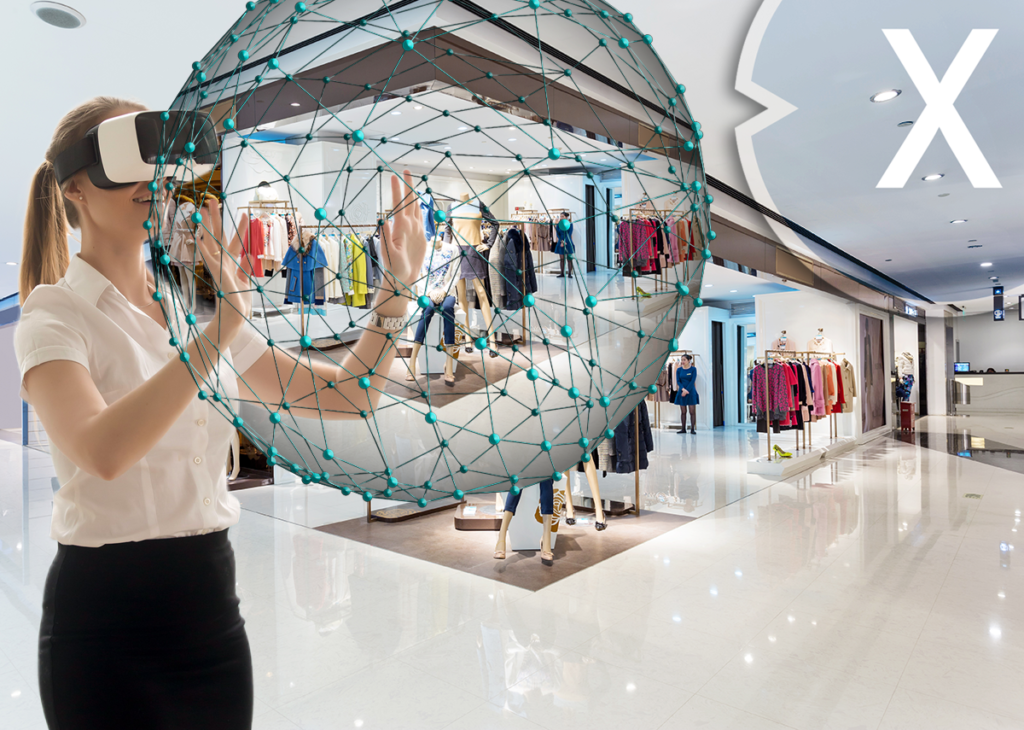
Metaverse & Extended Reality training, lecture or workshop for augmented, mixed and virtual reality – Xpert.Digital
In today's digital era, technology is evolving at a rapid pace. There are constantly new terms and technologies that need to be understood and mastered. If you're having trouble keeping up with topics like Metaverse, XR technologies, or immersive 3D, you're not alone.
More about it here:
🌐 The Industrial Metaverse
The industrial metaverse is said to create significant business value and provide numerous opportunities for innovation and growth.
1. What is the Industrial Metaverse?
The industrial metaverse is an augmented digital world that combines physical and virtual realities. It goes beyond simple VR or AR applications and allows companies to map their physical activities in a virtual environment. This can range from product development to manufacturing to sales logistics.
2. The business value of the industrial metaverse
Companies that have already implemented Metaverse use cases are convinced of their potential. In a survey, 80% of respondents said these use cases will have a significant or transformative impact on their business. This shows that the industrial metaverse is not just hype, but actually offers measurable benefits.
3. Innovative capabilities by connecting physical and virtual use cases
One of the most fascinating features of the industrial metaverse is the ability to connect physical and virtual use cases. This opens up additional innovative capabilities that enable companies to accelerate the implementation, adoption and monetization of Industry 4.0.
4. Use cases in the industrial metaverse
Companies can use the industrial metaverse in various areas to increase their business value:
Product development
Virtual prototypes and simulations make it possible to develop products faster and more cost-effectively.
production
Virtual factories can optimize processes and increase efficiency.
sales and marketing
Virtual showrooms and experience-oriented presentations help with customer acquisition.
Training and continuing education
Virtual training and simulations improve employee skills.
Customer service
Virtual agents and environments provide enhanced support and advice.
5. Examples of companies in the metaverse
Major companies like Microsoft and Facebook have already made massive investments in the metaverse. But smaller companies are also finding their place in this emerging digital world. Game companies like Epic Games have recognized the potential of the Metaverse and are developing platforms and content for it. Even retailers like Walmart and Kaufland are exploring the possibilities the metaverse offers for e-commerce and customer loyalty.
6. Challenges and risks
Although the industrial metaverse is promising, there are also challenges and risks that companies must consider. These include privacy concerns, the security of virtual environments and the need to train employees to use this technology.
7. Future outlook
The industrial metaverse will continue to evolve and offer new opportunities. It is expected that technology will continue to improve and more companies will take advantage of the Metaverse. This could lead to a revolutionary change in the way companies operate and how people interact with each other.
🚀 The industrial metaverse represents an exciting development in the business world. It promises significant business value by connecting physical and virtual use cases and offers innovative capabilities that can accelerate the implementation of Industry 4.0. Companies should prepare for this emerging technology and strategize their use cases to capitalize on the opportunities presented by the industrial metaverse.
🗒️ New territory for newbies: What you should know now about blockchain, tokens, NFTs, wallets, cryptocurrency and the metaverse
In today's digital world, terms such as blockchain, NFTs, wallets, cryptocurrencies and the metaverse have become increasingly present. For newcomers, these terms may seem confusing and complex at first. Here we try to explain these terms in an understandable way and give you important and interesting details about them.
More about it here:
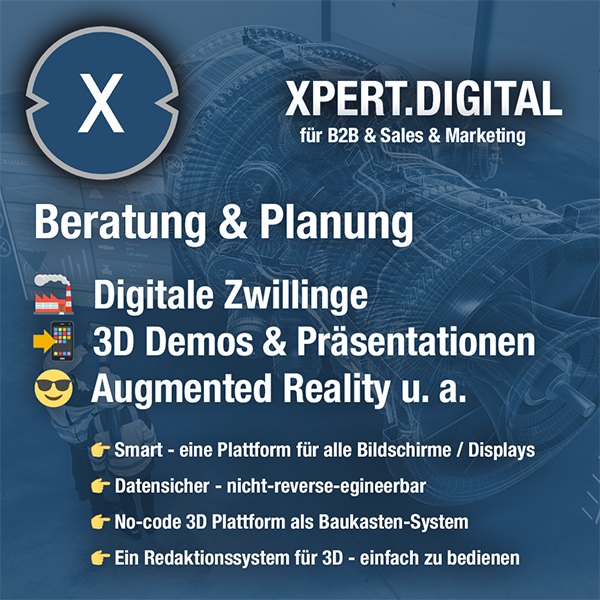
We are there for you - advice - planning - implementation - project management
Xpert.Digital - Pioneer Business Development
Smart Glasses & KI - XR/AR/VR/MR industry expert
Consumer metaverse or meta -verse in general
If you have any questions, further information and advice, please feel free to contact me at any time.
I would be happy to serve as your personal advisor.
You can contact me by filling out the contact form below or simply call me on +49 89 89 674 804 (Munich) .
I'm looking forward to our joint project.
Xpert.Digital - Konrad Wolfenstein
Xpert.Digital is a hub for industry with a focus on digitalization, mechanical engineering, logistics/intralogistics and photovoltaics.
With our 360° business development solution, we support well-known companies from new business to after sales.
Market intelligence, smarketing, marketing automation, content development, PR, mail campaigns, personalized social media and lead nurturing are part of our digital tools.
You can find out more at: www.xpert.digital - www.xpert.solar - www.xpert.plus



